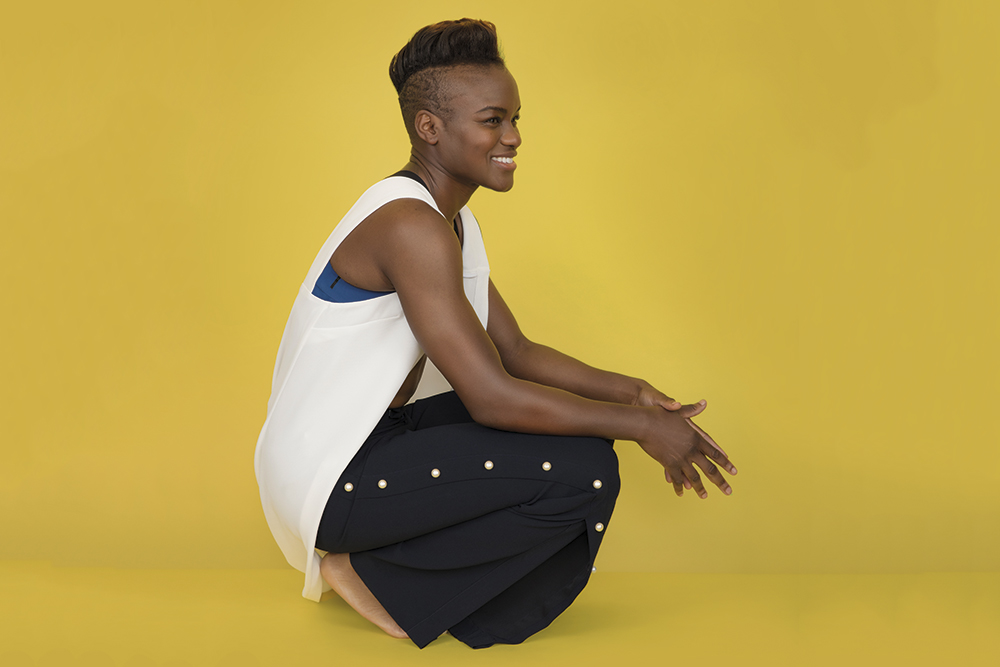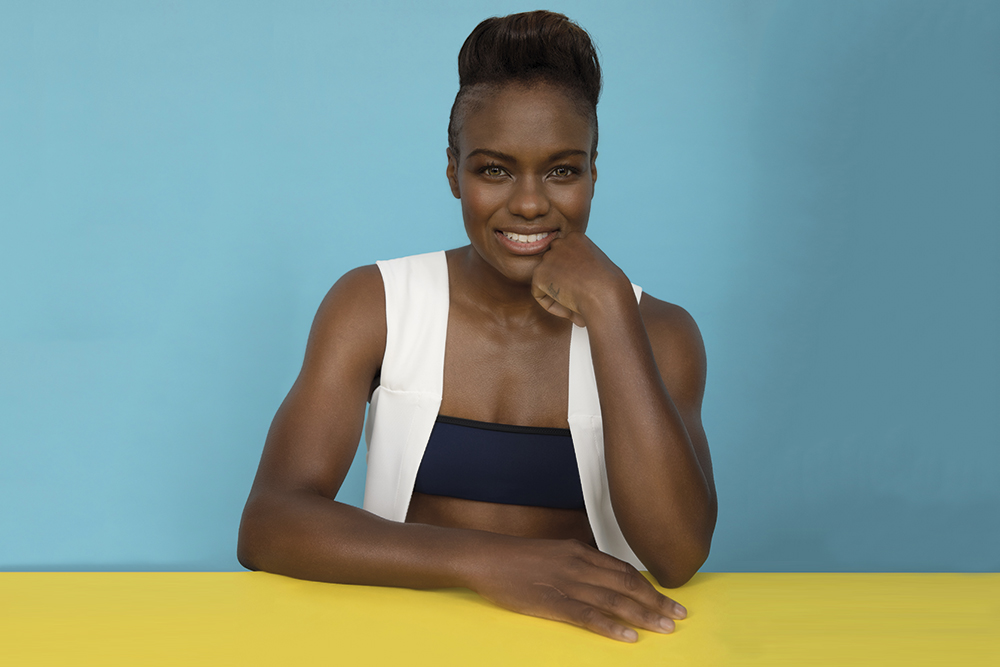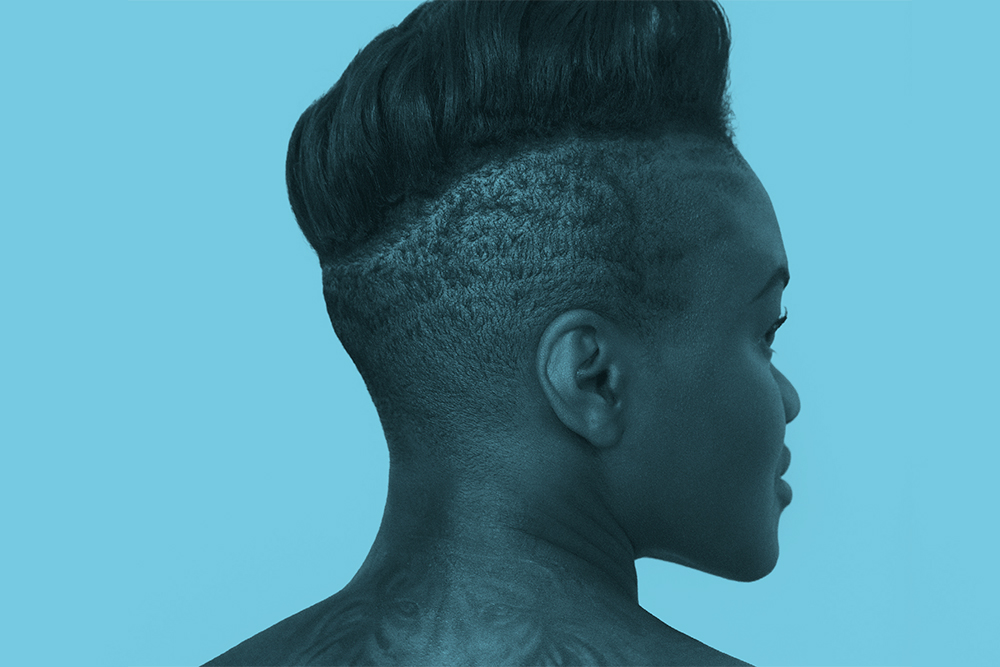Who’s the real Nicola Adams?

The morning drizzle has turned torrential. We’re sitting in a light-filled studio in east London watching Nicola Adams flash the same luminous smile that greeted the roaring crowd at London 2012 when she won gold in the women’s flyweight final. Overnight, she became the world’s first female boxing Olympic champion, a health and fitness icon and a national treasure.
Nicola, 34, enters the Balance studio wearing a black Adidas tracksuit and chic Ray Ban specs that accentuate her features – high cheekbones, bright hazel eyes and that beaming grin. We notice her face bears no scars. ‘I’m too good!’ laughs Nicola between flashes of the camera. Undoubtedly so.
Since becoming the first female boxer to represent England in 2001, Nicola has rewritten sporting history over and over. She became English amateur champion in 2003 and is the first woman to have won European, Commonwealth and World titles. Last summer, at Rio, she was the only British boxer since 1924 to retain an Olympic gold.
PAVING THE WAY
‘It’s easy to achieve goals when almost every time you step into the ring you’re making history. It’s nice to think that even long after I’m gone, that history is still going to be there,’ says Nicola, who moved from amateur boxing to the more lucrative professional game earlier this year, fighting under the name The Lioness.
Her decision to sign with legendary boxing promoter Frank Warren was remarkable, given that three years ago he declared: ‘I don’t like women’s boxing. Never have, and never will.’ Nicola must be the forgiving sort.
‘It’s an unlikely pairing!’ she admits. ‘When I went to see him, he said: “You’re the person who’s changed my mind about women’s boxing.” The fact that I’ve been able to change people’s minds and perceptions is nice.’
Women’s boxing dates back to the 1720s, but was illegal throughout much of modern history because, among many explanations, it was thought that PMT made women unstable in the ring (yes, really). Even after the Amateur Boxing Association lifted the ban in 1996, Nicola – who took up the sport at the age of 12 – has repeatedly encountered sexism.
‘Some of the coaches were against women’s boxing. They would say that they didn’t train female boxers or they didn’t have facilities in the gym for girls. It was just excuses,’ she says.
At the age of 13, one year before the ban was scrapped, Nicola competed in her first junior fight in a Leeds working men’s club. That same year, she was diagnosed with attention deficit hyperactivity disorder (ADHD), and says boxing became her ‘medication’ – a ‘go to’ when she felt overwhelmed.
The fact that Nicola became a flag bearer for women’s boxing is testimony to her unflappable self-belief, an attribute that accelerated her recovery from a cracked vertebrae in 2008 to qualify for London 2012. It also inspired the huge tattoo on her upper back – a lion and, beneath it, the words: ‘I am everything I want to be.’
‘You’ve got to believe in yourself; it’s all about confidence. I never think I’m not good enough. I know I’m always good enough to win,’ explains Nicola.
POSITIVE POWER
She began practising visualisation – a technique that uses positive mental images to make things happen – long before sports psychologists recommended it as a tool for success. As a young girl, before female boxing was an Olympic sport, Nicola pledged to her mother
that she would one day win a gold medal boxing at the Olympics.
‘Victory is as much about mental strength as physical power,’ she says. ‘In the dressing room before a fight, I see myself winning. If you think about losing, you’ve already lost.’ All this fighting talk could seem distinctively un-British, but in person Nicola is unassuming, warm and quietly confident – she’s far from extrovert.
Always looking for ways to improve her performance, in February Nicola relocated to America to work with Amir Khan’s trainer, Virgil Hunter, at his famous Oakland gym in
San Francisco.
‘As a boxer, you can never be perfect. You’re never the finished article. You can always be more technically sound, faster, stronger.’
Ask her to ponder her weakness, and Nicola looks awkward. She struggles to find an answer, as if highlighting a chink in her armour might leave her exposed. Instead, she settles on a safe answer – food. ‘I’ve got a thing for cakes – I’ve got a sweet tooth,’ she says.
At the start of the interview, Nicola perches gingerly on the edge of the sofa, perhaps cautious about stepping into a conversational ring where she’s not in control. She later admits she ‘doesn’t do’ emotions and in her new memoir, Believe, recalls burying her feelings when her mother nearly died from meningitis. She was 13 at the time and put on a brave face for the sake of her younger brother Kurtis, now 27.
As the questions flow, Nicola reclines into the cushions and loosens up, particularly when recalling various pinch-me high-profile encounters.
In March, she received an OBE from the Queen: ‘That made me nervous because there are loads of rules – you have to curtsey, which I’d never done before.’ There was a lunch with West Ham vice-chair Karren Brady: ‘I’m an Arsenal supporter, but I went anyway.’ And a thrilling conversation with Daniel Radcliffe at an awards ceremony: ‘He said he’d watched a few of my fights and commented on how well I was doing. I’m a fan of his. I was into Harry Potter!’
Nicola says she loves the glitz and glamour of her life and is now so famous that she was recently recognised in a changing room by her Leeds accent alone.
HARD KNOCKS
It’s a fairytale ending for the girl raised on a council estate by parents Dee and Innocent, who argued so intensely that Nicola recalls, around the age of four, jumping in front of her mum wielding a plastic sword to keep her father away. They divorced when Nicola was 11, after she had spent three years begging her mother to leave.
How did a childhood marred by violence affect her? ‘It was tough, but it made me mentally stronger,’ says Nicola. ‘You just know when something’s not right, no matter how old you are.’
Save for a ‘good luck’ text before Rio, it’s been five years since Nicola saw her father after he showed up unannounced at London 2012. ‘We don’t speak,’ she says. ‘That’s my choice.’
Nicola now has other things on her mind. ‘I want to be a world champion,’ she smiles. ‘I think it’ll take about a year.’
Her take-no-prisoners training schedule is priming her for professional glory. ‘I train three times a day, five days a week,’ she says. ‘When I wake up, I go for a run – the longest is three miles. Mid-morning is strengthening and conditioning, so resistance weights and press-ups. Then, in the afternoon, it’s all about boxing.
‘The running is the hardest bit, because you’re always pushing yourself. There’s never a run where you feel like “I’m getting good at this now”.’
INSPIRING OTHERS
Nicola, who can squat an impressive 90kg, is proud to be one of Britain’s most influential role models. After her 2012 glory, there was a 50% increase in women taking part in boxing. ‘It’s an honour to think that I can inspire kids to get involved in sport, and I definitely like promoting a strong, muscular body. Skinny doesn’t always mean you’re healthy,’ she says.
When Nicola’s not working out, she’s sometimes stretching. ‘I do hot room yoga when I’m in training camp, once a week – and I’m always in pain because I’m trying to stretch my body into all these different positions!’ laughs Nicola. ‘I’m not that flexible, so it really tests my body.’
On a day-to-day basis, Nicola has an everything-in-moderation approach to eating, but in the period leading up to a fight – to keep her weight under the 53.6kg limit – she has to cut back.
SELF-DISCIPLINE
‘When I’m training for a fight, my diet is strict. I cut out all my cakes and the chicken and waffles because I’ve got to keep my weight down. I pretty much only eat chicken, steak and vegetables, and I don’t drink any alcohol until after I compete.’
Other than diet and fitness, what’s her best tip for maintaining a healthy body? ‘Drink lots of water,’ she says. ‘Keeping hydrated is key.’
Nicola has eaten healthily since childhood when, along with asthma and eczema, she developed severe allergies to foods, including dairy, nuts, fish and chocolate. ‘Mum cooked everything from fresh,’ recalls Nicola. Nothing produced in a factory, including sweets, passed Nicola’s lips.
These days, nuts are her only aversion and at the end of 2015 she fell in love with female boxer Marlen Esparza, 27, after suffering an allergic reaction to vegan cheese at a training camp in Colorado. Marlen rushed her to hospital and within weeks they were dating. Last Christmas, Nicola proposed.
‘We don’t have a date for the wedding because we’ve got a lot going on at the moment with training,’ says Nicola.
So, what about children? ‘I need to get the boxing out of the way,’ she replies. ‘I’m only going to be in the professional game for two or three years – then I’ll go off and do commentating, some acting and TV presenting. So three years, and then it might be time for children.’
Surely it’s only a matter of time before this prize-fighter creates a new type of history outside the ring.
Believe by Nicola Adams is out now, published by Viking in hardback, ebook and audio download, priced £14.99.
NICOLA’S TIPS GOT A CHAMPION MINDSET
DIET
Food affects your mood as well as your weight. If you eat something that’s full of sugar, at some point that sugar will wear off and you’ll crash. Eat nutritious foods like bananas. They contain a protein that converts into serotonin, which makes you feel happy and in control.
COURAGE
To be confident in front of other people, you’ve got to have inner self-belief, which means backing yourself 100%. Remember why you’re good and if a negative thought creeps into your mind, visualise yourself succeeding. Picture it in your head as if it’s really happening.
DEDICATION
When you have a goal to strive for, you know what you’re working towards, which makes it easier to be wholly committed. With focus comes a desire to invest time, which makes you work towards being the best.
Read more: What happened when we met Davina McCall…











